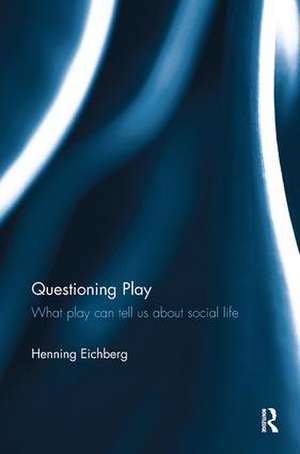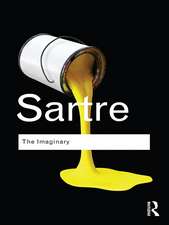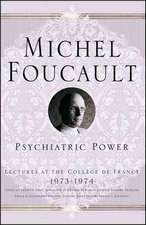Questioning Play: What play can tell us about social life
Autor Henning Eichbergen Limba Engleză Paperback – 3 ian 2018
- play as a practice of search
- playing, learning and progress
- the light and dark sides of play
- playing games, sport and display
- folk sports, popular games, and social identity
- play under the conditions of alienation.
This book offers a challenging contribution to the interdisciplinary field of the philosophy of play. It will be fascinating reading for any student or researcher interested in social and cultural anthropology, phenomenology, and critical sociology as well as the ethics and philosophy of sport, leisure studies, and the sociology of sport.
.
| Toate formatele și edițiile | Preț | Express |
|---|---|---|
| Paperback (1) | 325.34 lei 6-8 săpt. | |
| Taylor & Francis – 3 ian 2018 | 325.34 lei 6-8 săpt. | |
| Hardback (1) | 821.13 lei 6-8 săpt. | |
| Taylor & Francis – 11 iul 2016 | 821.13 lei 6-8 săpt. |
Preț: 325.34 lei
Preț vechi: 371.71 lei
-12% Nou
Puncte Express: 488
Preț estimativ în valută:
62.26€ • 64.76$ • 51.40£
62.26€ • 64.76$ • 51.40£
Carte tipărită la comandă
Livrare economică 14-28 aprilie
Preluare comenzi: 021 569.72.76
Specificații
ISBN-13: 9780815357261
ISBN-10: 0815357265
Pagini: 284
Ilustrații: 10 Illustrations, black and white
Dimensiuni: 156 x 234 x 21 mm
Greutate: 0.45 kg
Ediția:1
Editura: Taylor & Francis
Colecția Routledge
Locul publicării:Oxford, United Kingdom
ISBN-10: 0815357265
Pagini: 284
Ilustrații: 10 Illustrations, black and white
Dimensiuni: 156 x 234 x 21 mm
Greutate: 0.45 kg
Ediția:1
Editura: Taylor & Francis
Colecția Routledge
Locul publicării:Oxford, United Kingdom
Public țintă
Postgraduate and UndergraduateCuprins
Part I: Cases of movement play
1. Soccer, crisis, and grace: how round is the Danish ball?
2. Wandering, winding, wondering: what is happening in the labyrinth?
Part II: Critical questions to some play-philosophical commonplaces
3. Colonial and relativistic approaches to the cultural anthropology of play: do we need a definition of play?
4. Unproductive play? What is productivity?
5. Play, learning, and progress: but what about the elderly in play?
6. Innocent play, war games, playing with fire: what about dark play?
Part III: Play as diversity and question
7. Play, game, display, sport: how does language differentiate the understanding of concepts?
8. Play and curiousness: what is the question?
Part IV: Socio-political dimensions of play
9. Folk sports, popular games: who is the folk, who are the people?
10. Play and acceleration: play as an opposite to alienation?
1. Soccer, crisis, and grace: how round is the Danish ball?
2. Wandering, winding, wondering: what is happening in the labyrinth?
Part II: Critical questions to some play-philosophical commonplaces
3. Colonial and relativistic approaches to the cultural anthropology of play: do we need a definition of play?
4. Unproductive play? What is productivity?
5. Play, learning, and progress: but what about the elderly in play?
6. Innocent play, war games, playing with fire: what about dark play?
Part III: Play as diversity and question
7. Play, game, display, sport: how does language differentiate the understanding of concepts?
8. Play and curiousness: what is the question?
Part IV: Socio-political dimensions of play
9. Folk sports, popular games: who is the folk, who are the people?
10. Play and acceleration: play as an opposite to alienation?
Notă biografică
Henning Eichberg is an historian, cultural sociologist, and philosopher. As Professor Emeritus at the University of Southern Denmark, he works in the Centre for Sports, Health and Civil Society at the Department of Sports Science and Clinical Biomechanics
Recenzii
"Questioning Play is questioning a phenomenon, which is a question itself and as such prone for doing philosophy of interrogation. Eichberg is practicing his own “bottom-up way of philosophy” and succeeds in demonstrating an immense empirical knowledge of play and games put together in a peculiar, differential, “phenomenological” way. Thereby, he leaves a legacy of far-reaching significance for further critical socio-cultural studies, as well as personal imprints of a curious character with much vitality (despite a ailing physical body in later years) and an adventurous courage resembling the zeal and daring of mountain climbers." - Ejgil Jespersen, idrottsforum.org (2017)
Descriere
What is play? Why do we play? What can play teach us about life? This critical investigation argues that through play we can ask important questions about the world, others and ourselves. It offers a practice-based philosophical approach to understanding play, with historical, sociological and anthropological investigations of play in the real world.















